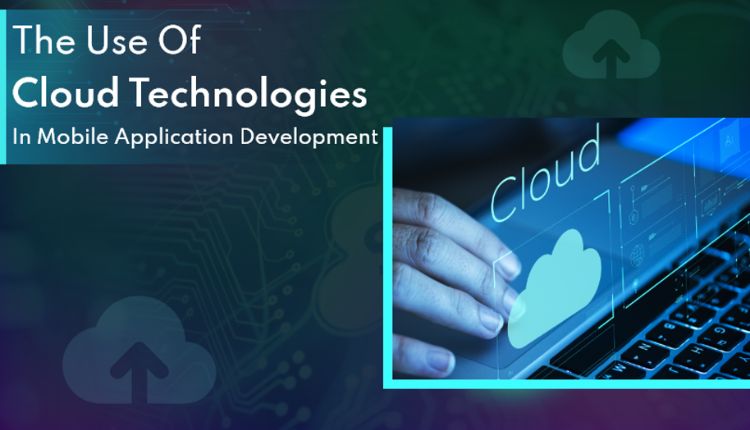As mobile application usage continues to grow, the demand for more efficient development strategies has increased. Cloud technologies have become a popular choice for developers, as they offer a range of advantages and benefits.
In this blog post, we’ll explore the advantages of using cloud technologies in mobile application development, and how they can help to improve the development process.
So, let’s get started!
Cloud Technologies – Understanding The Term
Cloud technologies are a set of computing and networking technologies that enable users to store, manage, and access data and services over the Internet. These technologies allow companies to store and access large amounts of data in a distributed and secure way, allowing users to access this data from anywhere, anytime.
Cloud technologies are becoming increasingly popular as they offer a number of advantages over traditional methods of data storage. Let’s read about the advantages of using cloud technologies in mobile app development.
Advantages Of Using Cloud Technologies In Mobile App Development
Cloud technologies provide many advantages when used for mobile application development.
1) Scalability
Developers can easily scale their apps up or down as needed, making it easier to adjust to changing user needs and trends. This means that the application will be able to handle more users as demand increases.
2) Fast Development
Using cloud technologies also allows developers to focus on core features instead of having to worry about hosting and managing servers. This makes development much faster, allowing developers to release applications to users sooner. Additionally, cloud technologies make it easy to quickly deploy updates and new features without having to manually deploy them to individual devices.
3) Security
Security is another major benefit of using cloud technologies. With cloud hosting, data is stored securely in the cloud and can be backed up if needed. According to the iOS app development services provider, the cloud provides an extra layer of security through its authentication methods, ensuring that only authorized users have access to your app.
4) Cost Effective
Cloud technologies provide cost savings over traditional server hosting solutions. Cloud hosting costs are typically much lower than running a dedicated server, meaning you can invest more money in development and testing instead of hardware and infrastructure. Additionally, cloud services often offer
pay-as-you-go pricing plans, so you can scale up or down depending on your needs.
Now, let’s explore the types of cloud technologies for mobile app development
Types of Cloud Technologies
Cloud technologies can be broadly categorized into three types: Infrastructure as a Service (IaaS), Platform as a Service (PaaS) and Software as a Service (SaaS).
- Infrastructure as a Service (IaaS): IaaS provides cloud users with access to computing infrastructure over the Internet. This type of cloud technology includes servers, storage, networks, operating systems and other related services. It allows developers to use the resources they need on demand without the need for physical hardware.
- Platform as a Service (PaaS): PaaS is a cloud-based platform that allows developers to build applications without the need for hardware or software installations. It provides pre-configured development environments that are ready for deployment. This eliminates the need for setting up servers, databases, or other components required for application development.
- Software as a Service (SaaS): SaaS provides cloud users with access to software applications that are hosted on remote servers. This type of cloud technology eliminates the need for software installation and maintenance, as users can access the applications directly from the cloud. As per the top mobile app development company in India, SaaS is often used for customer relationship management (CRM), project management and e-commerce applications.
Development Process Of Cloud-Based Mobile App
The development process of a cloud mobile app typically involves the following steps:
1) Define The App Requirements
Before starting the development process, it’s important to define the cloud-based mobile app’s requirements, including the platform, features, target audience, and desired user experience.
2) Design The User Interface
Once the requirements are defined, the user interface (UI) design can be built. This involves creating wireframes and mockups of the app’s screens and features and getting feedback from stakeholders.
3) Choose A Development Approach
There are several approaches to developing a cloud mobile app, such as native, hybrid, or web-based. The approach chosen will depend on the app’s requirements and target audience.
4) Develop The Backend Infrastructure
In order to support cloud functionality, a backend infrastructure must be developed that can handle data storage, synchronization, and authentication.
5) Develop The Frontend App
The frontend app can be developed using the chosen development approach, such as native tools or frameworks like React Native or Ionic.
6) Test & Debug The App
Once the app is developed, it needs to be tested and debugged to ensure that it works as intended on different devices and platforms. This involves using automated testing tools and manual testing by QA testers.
7) Deploy The App
Once the mobile app has been tested and approved, it can be deployed to the cloud and made available for download on app stores.
8) Monitor & Maintain The App
After deployment, the cloud-based mobile app needs to be monitored for performance issues and bugs, and regular updates need to be released to keep the app up-to-date and secure. This includes monitoring user feedback and making changes to the app as necessary.
Additionally, the development process of a cloud mobile app requires careful planning, collaboration between developers and stakeholders, and ongoing maintenance and monitoring to ensure the app’s success.
Popular Tools For Cloud-Based Mobile App Developmen
The most popular cloud-based mobile app development tools include:
- Microsoft Azure: Microsoft Azure provides an integrated development environment (IDE) for developing, testing, and managing mobile applications in the cloud. According to the best startup app development company, Microsoft Azure also offers a wide range of services, including analytics, virtual machine deployment, and more.
- Amazon Web Services: AWS is another popular cloud-based platform that enables developers to create mobile apps quickly and easily. It offers a host of features and services such as Amazon DynamoDB, Amazon S3, and Elastic Beanstalk.
- Google Cloud Platform: GCP is an all-in-one cloud platform that enables developers to build, deploy, and manage mobile apps on the web. It offers a wide range of features such as App Engine, Google Cloud Storage, and Compute Engine.
- Firebase: Firebase is a cloud-based mobile development platform that enables developers to quickly build, test, and deploy apps. It also offers real-time database synchronization and backend storage solutions.
Using these cloud-based mobile app development tools can help developers build powerful, feature-rich mobile apps with ease. They also make it easier for developers to keep track of their progress and collaborate with their team in real-time.
Conclusion
Cloud technology has become increasingly popular for mobile app development, due to its advantages and its ability to reduce development costs and time. The use of cloud technologies in mobile application development is highly recommended for developers who want to develop efficient and secure applications. However, you can get in touch with the best Cloud app development companies to get your mobile app developed with cloud technologies.

